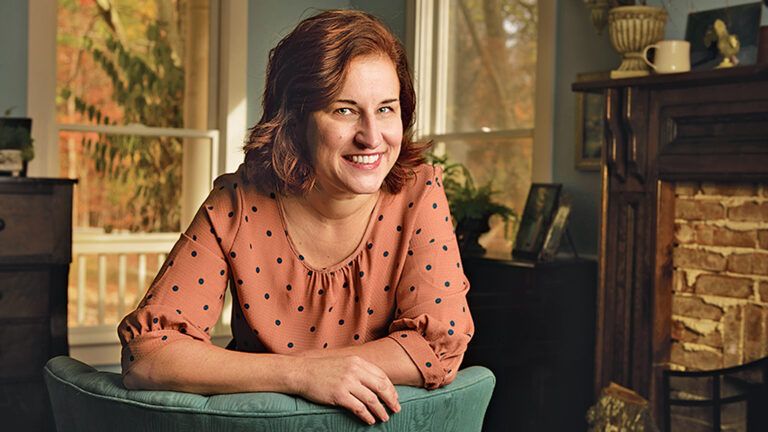Robin Roberts’ mother, Lucimarian Tolliver Roberts, passed away not long after this story appeared in the August 2012 edition of Guideposts.
I’ve interviewed many inspiring people on Good Morning America—world leaders, sports legends, heroes.
Still, there’s one interview I’ve always wanted to do, one person I wish would sit down with me on the show, except she’d be embarrassed by the attention and insist there were far more deserving folks.
That’s my mother, Lucimarian Tolliver Roberts. She’s led a remarkable life. Believe me, she’s truly deserving.
I’m not just saying that because she’s my mom and I love her. She has lived so many of the events that shaped this country—from the Great Depression to the civil rights era—and faced many challenges.
But Mom would much rather ask about you than talk about herself (maybe that’s where I get my interviewing skills from) and share an uplifting story she’s read than tell her own.
Whenever someone in our family wanted to hear more about her life, she’d say, “Someday I’ll write a book and put it all down.”
Now at age 88, she has. My Story, My Song was published this spring, and the title could not be more fitting. Music is my mother’s joy in times of celebration and her comfort in times of heartache.
She knows that “Wherever I am, God is,” just as the prayer of protection she taught me says (the prayer I start my day with).
Still she likes having a special place to meet with God. The piano has been that place for her ever since she taught herself to play by ear as a little girl in Akron, Ohio.
Mom grew up beyond poor. Her father lost his job in the Depression and turned to drinking.
One of her earliest memories was seeing strangers carting off her parents’ bedroom furniture. Then the living room sofas went, the crystal doorknobs, the rugs. The electricity and gas were turned off.
Her mother, determined to keep a stable home for the children, got a job cleaning houses for a dollar a day.
My grandmother had, as Mom puts it, “the most marvelous way of taking what life served her and making the best of it.” She held the family together and showed her children that success wasn’t about money. What counted was your character and faith in God.
The family was in church every Sunday, and that’s where Mom learned to sing the spirituals and hymns that she says are “like a prayer with a melody.”
I knew Mom would be proud to share stories about her mother, but I was surprised to see how openly she wrote about her father’s troubles. I hadn’t realized the extent of it until I read a draft of her book.
“You’re really going to tell everyone your dad was an alcoholic?” I asked.
“Yes,” she said. “And I’m also going to tell them how he found the Lord and quit drinking.”
Faith definitely transformed my grandfather’s life. I don’t remember him as an alcoholic. What I remember is him counseling people and preaching the good word from the pulpit on Sundays.
In second grade Mom was assigned to Miss Schnegg’s class. The teacher saw something in the bright little girl with the lovely voice and mentored her all through high school.
Grandma valued education, but since her own didn’t extend beyond sixth grade, it was Miss Schnegg who pushed Mom to set her sights high and take college prep classes. Who helped her get a scholarship to Howard University and become the first in her family to go to college. Who inspired Mom to go into teaching and later chair the Mississippi Board of Education.
At Howard, Mom fell for a handsome student named Lawrence Roberts. World War II interrupted their courtship. He joined the U.S. Army Air Corps as a private and in 1944 entered the training program for the Tuskegee Airmen, our country’s first black military pilots.
“I had to wait till the war was over to marry your father,” Mom reminded us. “Any notion that a groom should not see his bride before the wedding we had to dismiss because we were too busy setting up chairs and tying crepe paper bows to the branches of the apple tree.”
Mom and Dad moved 27 times in the course of his 32-year career. In those early days, the armed services were newly integrated, and Mom was usually the only nonwhite officer’s wife.
Times had changed so much by the time I came along (I’m the youngest of four) that it wasn’t until I read her book that I truly understood the anger and hurt she felt at being excluded, being stared at, having the room go silent when she walked in.
The loneliness was tremendous. My brother, Butch, the oldest, was just a toddler when Mom and Dad were stationed in Japan.
“Nothing prepared me for the isolation I felt as the only black woman on a base in a foreign country,” she says. What did she do? She met God at their special place.
“The base chapel was always open and I’d slip in and play the piano,” she says. She’d sing her favorite hymns. “After an hour I felt revived.”
It’s no wonder then that church on Sundays was mandatory for us Roberts kids. A cold was no excuse. The three of us girls, Sally-Ann, Dorothy and I, had to wear our white bobby socks and best dresses too.
For some families, it’s the three R’s. For us it was the three D’s: Discipline, Determination and Da Lord.
Not that Mom was dignified and disciplined all the time. Dad retired as a colonel in 1975 at Keesler Air Force Base in Biloxi, Mississippi. My parents settled down on the Gulf Coast in the town of Pass Christian, Mississippi, where I went to high school and the place I call home.
I didn’t go far for college—Southeastern Louisiana University, less than 100 miles away. I played basketball and Mom and Dad loved to come to my games. Even retired, Dad was all military and buttoned up. Not Mom. She was loud.
“I’m not sitting next to her!” he’d tease. So he’d sit at one end of the gym and she’d sit at the other. I could pick out her voice, leading the cheering. “Two bits, four bits, six bits, a dollar,” she’d get everybody to shout, “all for Southeastern, stand up and holler!”
The only time I can think of Mom taking me down a notch was several years ago after a commencement speech I gave. I thought I’d done a good job, talking about what I’d accomplished, what I’d learned, how I’d dealt with adversity.
Mom, though, was quiet. Finally I asked what was wrong. “You forgot to mention all the people who have helped you,” she said. “We never do it just on our own. There are all those people behind us, our teachers, coaches, pastors, mentors.”
And our parents. Come to my dressing room at the GMA studio, and you’ll see a lot of Mom and Dad. Photos, a favorite quote of Mom’s, models of the airplanes Dad flew.
Dad died in October 2004 at age 81. A heart attack took him in the middle of the night. Mom was griefstricken. I didn’t know how she was going to cope. I wasn’t sure how I would.
Mom wasn’t up to hosting Thanksgiving, so I asked her to visit me in New York. Diane Sawyer, my dear friend and colleague, was having people over and invited us. “We don’t have to go, Mom,” I said. “We can do something small.”
“I want to go,” Mom said. She has never been shy about meeting people.
At dinner we went around the table and everyone shared a reflection. Mom, it’s all right, I thought. You don’t have to say something so soon after Dad’s death.
Right there at the table Mom began to sing in a soft, true voice, “By and by, when the morning comes, when the saints of God are gathered home…”
At the chorus another beautiful voice joined in. Diane’s. “We’ll tell the story of how we’ve overcome, for we’ll understand it better by and by.”
The comfort of Mom’s faith was so strong I felt it too. Even more so a few years later when I was diagnosed with breast cancer. I woke up from surgery and saw her sweet face looking at me. She’d been praying for me.
She held my hand, stroking it as only a mother can, and I knew the healing process had begun.
Remember how I said Mom would be too embarrassed to be interviewed on Good Morning America? She says it’s because her book isn’t about her as much as all those who’ve helped her along the way. And I mean all.
When I was home for New Year’s, Mom dictated the acknowledgments to me. She went on and on. “You don’t have to mention everyone you’ve ever met, you know,” I said.
“These people are important to me. I can’t leave anyone out,” she insisted.
Then I went back to New York and she called me and added more names! I was about to tell her to stop when it hit me. Why put a limit on gratitude?
Mom’s right. We sing the melody to our life’s song, but the people who touch us provide the harmony. And underneath it all, guiding us and supporting us, is the rhythm of our faith.
Watch as Robin Roberts describes seeing her mother's comforting face following Robin's surgery.
Visit our Robin Roberts Pinterest board.
Read an excerpt from My Story, My Song.
Download your FREE ebook, True Inspirational Stories: 9 Real Life Stories of Hope & Faith





